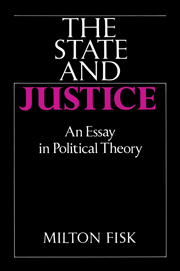Book contents
- Frontmatter
- Contents
- Preface
- Introduction: Can the state rule without justice?
- Part One An outline of a materialist political theory
- 1 A challenge to materialism
- 2 A framework for the state
- 3 The revolt against theory
- 4 State autonomy
- Part Two An assessment of the place of justice in the state
- Part Three A functional view of political institutions
- Part Four An account of the community of states
- Part Five A reflection on the transition to a new kind of state
- Conclusion: State, class, and democracy
- Notes
- Index
- Frontmatter
- Contents
- Preface
- Introduction: Can the state rule without justice?
- Part One An outline of a materialist political theory
- 1 A challenge to materialism
- 2 A framework for the state
- 3 The revolt against theory
- 4 State autonomy
- Part Two An assessment of the place of justice in the state
- Part Three A functional view of political institutions
- Part Four An account of the community of states
- Part Five A reflection on the transition to a new kind of state
- Conclusion: State, class, and democracy
- Notes
- Index
Summary
In the Introduction I discussed the conflict within the state between justice and the economy. In Chapter 2 a materialist framework model emerged as a basis for political theory. In this chapter these two themes come together. Class struggle, based in the economic framework, shows up within the state as a conflict between justice and the economy. And this conflict is the key to what is called the autonomy of the state.
When justice and the economy collide
The meaning of the conflict between justice and the economy is that limits placed by the state on losses and benefits interfere with tendencies within the economy. In the extreme these limits threaten the very existence of the economy. Within the modern liberal democratic state one aspect of the overall conflict is the specific conflict between democracy and capitalism. Democracy is part of a pattern of justice because it limits loss of control by the many and limits monopolizing control by the few. The thrust toward more widely shared control encouraged by democracy conflicts with the restricted control encouraged by capitalism. The state's liberal function of promoting capitalism and its democratic form fail to come together in a harmonious institution. So long as democracy remains a widely accepted condition for legitimate rule, this contradiction cannot be eliminated. Of course, people can be dominated without legitimate rule, but such an arrangement is likely to be unstable.
- Type
- Chapter
- Information
- The State and JusticeAn Essay in Political Theory, pp. 50 - 64Publisher: Cambridge University PressPrint publication year: 1989



